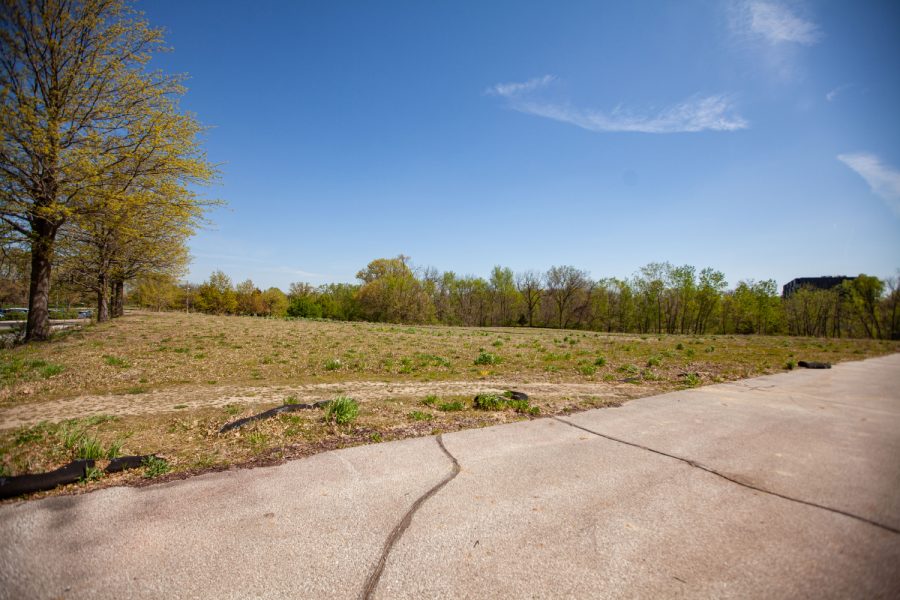New four-story residential unit coming to Iowa City, pending regents approval
The University of Iowa will use land annexed from University Heights to Iowa City to allow a third-party to develop a residential complex for those 55 and older, which has raised concerns from affordable housing advocates.
A piece of land located near the intersection of Finkbine Commuter Drive and Melrose Avenue as seen on Sunday, May 2, 2021. The land is being rezoned to make way for housing.
June 2, 2021
The state Board of Regents’ property and facilities committee approved for consideration phase one of the Finkbine Development plan, which will develop 6.12 acres of land into a four-story residential unit.
University of Iowa Business Manager David Kieft said during a presentation to the committee on Wednesday that in 2018, the university identified several vacant sites around campus athletic facilities that did not fit within the UI’s master plan.
“This is a project that’s been numerous years in the making,” Kieft said.
He said in identifying these sites, the university has been looking to see what private development may be attractive to third-parties and bring revenue into the UI while still fitting the university’s vision.
The first phase will include a 30-year ground lease with Melrose Partners, LLP, to create an active adult (55+) residential community, according to Kieft.
According to the project description, the community will be a 110-unit, four-story residential complex with one level of underground parking.
The university will receive $130,000 per year in ground lease rent, which will escalate by 10 percent every five years during the 30-year period. At the end of 30 years, the developer can choose to extend its lease. If not, it will revert to UI ownership.
Kieft said it was important for the UI to have control over the site, as it is a gateway into UI Hospitals and Clinics, Kinnick Stadium, and main campus.
One significant challenge over the last year for this project, Kieft said, was that the land in question – the site of the former University Athletic Club – is partly in the City of Iowa City and partly in the City of University Heights. He said there were issues with life safety and first responders, and election and taxing districts.
This project and the transference of land has raised concerns among affordable housing coalitions. As previously reported by The Daily Iowan, Sara Barron, president of the Johnson County Affordable Housing Coalition, raised concerns over the affordability of the new residential complex.
Barron said during an Iowa City City Council meeting on May 2 that the city council should have ensured that affordable housing will be included in this development before agreeing to the annexation.
Per Iowa City’s annexation guidelines, at least 10 percent of housing units on newly annexed land must be affordable for at least 20 years. Developers have an option to include affordable housing units, or to pay a fee in lieu of the units to the city which will go towards the city’s affordable housing fund.
Barron said she thought paying a fee in lieu can benefit the city’s long term affordable housing goals, as the city can better plan the location of affordable housing units and the lifespan of the affordability component, as well.
After discussions with both cities’ leaders within planning and zoning departments and the city councils, Kieft said it was agreed that all of the land will be annexed and moved into the City of Iowa City.
The project description states that the development will generate new property tax revenue for both cities. However, the underlying land owned by the UI would be tax-exempt – only the new building will be subject to local property taxes.
Kieft added that the State of Iowa – City Development Board approved the boundary adjustments and the tax sharing agreement. According to Kieft, it will be a ratio of 47 percent and 53 percent, City of Iowa City and University Heights, respectively.
The university, as part of phase one, will also convey 1.25 acres of undeveloped land to University Heights, due to University Heights voluntarily transferring 3.61 acres of land to complete this project.
The regents’ property and facilities committee passed the project for consideration, and it will go before the entire regents for approval.



